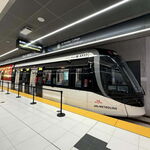Woodbridge_Heights
Senior Member
Yikes how did i miss that!!! Lets add the qualifier "without a regional transit system" then the comment should still work. (Im counting the OC transpo as a regional transit system)*Cough* *Ottawa* *Cough*
Yikes how did i miss that!!! Lets add the qualifier "without a regional transit system" then the comment should still work. (Im counting the OC transpo as a regional transit system)*Cough* *Ottawa* *Cough*
Perhaps you should reexamine those numbers because I can tell you from my own personal experience the ridership from Kitchener GO has grown substantially since the implementation of more trains this past September.Has any HSR advocate looked at the ridership numbers for the Kitchener GO Station? That should give you an indication of what kind of numbers HSR would attract (hint: it is not a large number).
Since I brought it up, I will provide link to source. Even if ridership has grown 50% since September, that is still very low daily ridership.Perhaps you should reexamine those numbers because I can tell you from my own personal experience the ridership from Kitchener GO has grown substantially since the implementation of more trains this past September.
Since I brought it up, I will provide link to source. Even if ridership has grown 50% since September, that is still very low daily ridership.
The low-frequency local neighbourhood bus routes in Toronto draw bigger numbers of daily riders. If we took a fraction of the capital cost of HSR and invested it in local service in Toronto, York Region, Mississauga, Hamilton, Durham, and K-W, we would service many many many times more people.
^There’s no question that current ridership is way below what it could be if the service were faster and more frequent. The right question is, what is the upper end of that demand and what kind of envelope does that justify? I have trouble believing that the “most positive scenario” would justify full HSR. And, if one did offer HSR, what price point does that imply and what is the upper limit of price? An example is student travel - with improved GO, it’s quite possible for students to find daily commuting to be cost effective as compared to living in residence. But suppose an air-competitive HSR were built, and the price point was shifted to charge what the air travel market might bear. That student market might vanish. Students may appreciate a one hour commute, but would not pay a premium to go Kitchener to Union in 40 minutes.
My gut says that merely equalling or beating road travel is the optimum service model, even if it leaves some business travellers flying at higher fares.
- Paul




